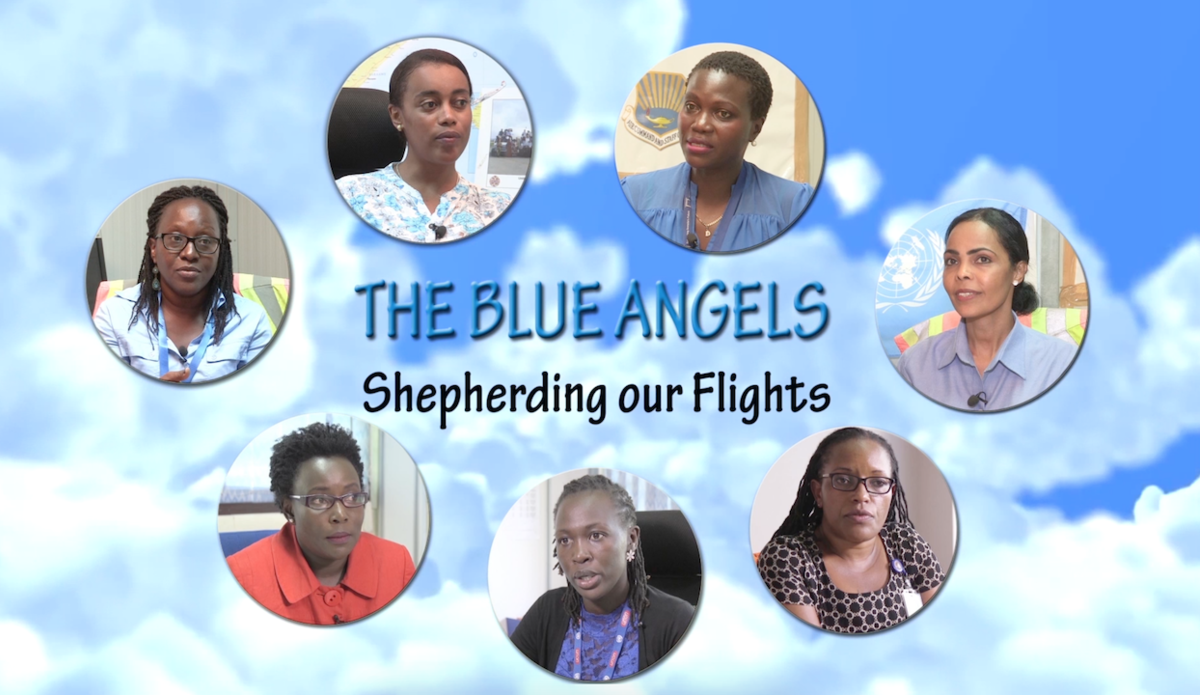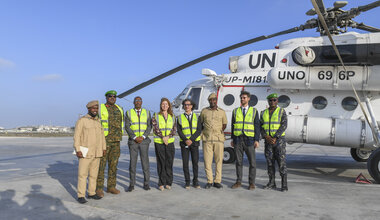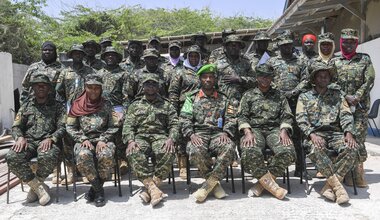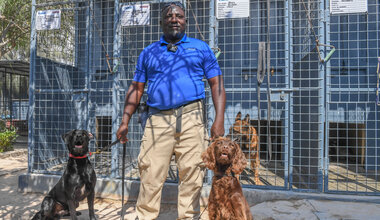“Blue Angels” Showcase the Best of United Nations’ Aviation Sector
MOGADISHU, Somalia - Seven outstanding professionals are breaking stereotypes about women’s achievements as they play leading roles in the demanding and fast-paced environment of the United Nations’ aviation sector.
The women - Hilda, Dorcas, Addisalem, Asmera, Esther, Barbara and Divine - are the “Blue Angels” of the United Nations Support Office in Somalia (UNSOS), which actively promotes women candidates to serve across all its areas including logistical support services like aviation.
UNSOS sees itself a as leader in closing the gender gap in the global workforce, thus the Blue Angels are indeed blazing a trail for other women in the field.
“We are heading in the right direction. We continue to push and we are confident that we will have more female staff members ...the role they have played has been especially valuable to the UN, ” said Amadu Kamara, UNSOS Director for Mission Support.
Hilda Baingana is UNSOS’ Technical Compliance and Quality Assurance Officer at Aden Adde airport in Mogadishu. Her career in aviation began while serving as officer - one of only two females in a team of ten - with the Civil Aviation of her native Uganda.
On completing a graduate diploma course in Aviation, Baingana attended the East African Civil Aviation Academy (EACAA) in Uganda, before joining the UN. She has since worked in Darfur and now Somalia.
Baingana emphasizes that her success in a male-dominated world has come not because of her gender, but her experience and skill. She is well aware of the risks that come with working in Somalia, which has earned a reputation for deadly terrorist attacks against civilians and international and humanitarian agencies.
“Last week a crew member was out jogging when he was hit by mortar fire. He was fortunately not badly injured, but we had to fly him to Mogadishu for treatment,” she recalls.
Still, Baingana affirms that she loves her job.
“It’s a great career for those who want to work in the aviation industry but don’t want to fly,” Baingana said.
Flying, is exactly what UNSOS Flight Operations Manager Asmera Sebhat always envisaged as a dream career.
“As a child, when anyone asked me what I wanted to do, I would say: to fly,” Sebhat states.
Sebhat’s career path in aviation took her to Sudan, where she was involved in emergency response and flight operations before she joined the UN’s mission in Mogadishu, where she manages the recording of all UN flights in and out of Somalia.
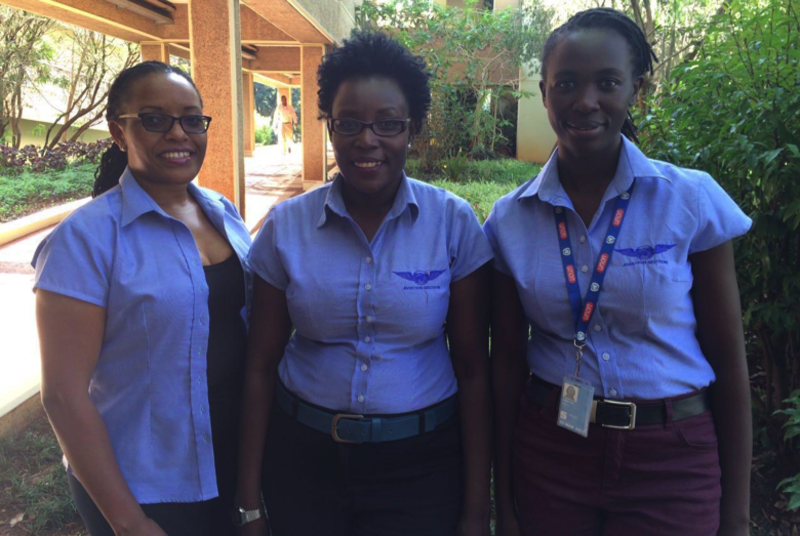 |
|||
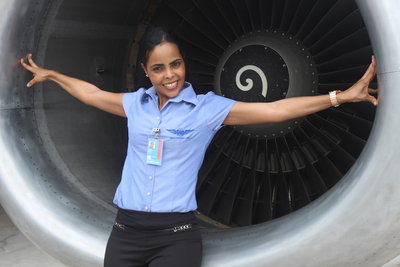 |
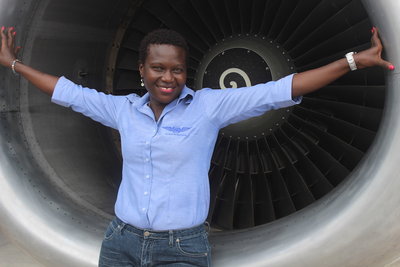 |
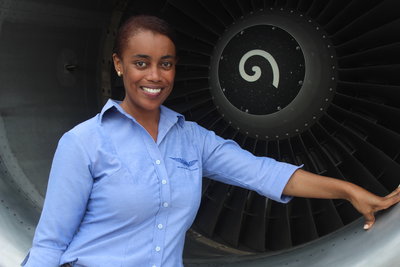 |
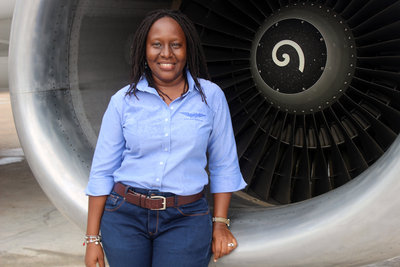 |
From Mogadishu To Nairobi, Blue Angels At Work
Each Blue Angel’s professional expertise and technical competence has earned them the praise and respect of their male peers and supervisors in both Mogadishu and Nairobi.
“The colour blue represents the UN colours as well as the Somali flag colours; angels fly above the clouds... So we decided to combine both and showcase the best of the best in UN aviation, “ said Ernest Manzano, the Chief Aviation Officer for the United Nations Support Office in Somalia (UNSOS), who coined the term.
Take Divine Bijurenda, the first woman in UN aviation to coordinate all rostered AMISOM services staff for pre-deployment training. The Kenya-based Chief of Aviation Planning and Logistics, realized her childhood dream of becoming an aviation expert; she also married a pilot, who unfortunately died tragically in a plane crash.
“My husband’s death changed my perspective in aviation, especially my approach to security and safety management,” Bijurenda said. “I know the impact and damage of a plane crash and therefore have a keen interest in ensuring the highest standards of safe operations and technical competence in mitigating risk and threat for UN Air Operations.”
Bijurenda’s high-profile position puts her in charge of coordinating aviation logistics which includes aircraft acquisition, airfield infrastructure and development, and ensuring that aviation staff remain certified and technically competent to execute their functions.
But her career has not been without challenges. Bijurenda says she has fought prejudice and anxiety as well as the pressure to fit into the “boy’s club.”
“My job is result- oriented and demands a level of creativity when addressing the daily needs of the different stakeholders. Aviation is versatile; given the continuous advances in technology. So male or female, in my industry, you have to be current to survive and remain relevant,” Bijurenda said.
UNSOS’ Aviation and Security Courses Build Capacity In Workforce
As part of the UN’s Global Field Support Strategy management, UNSOS has developed and implemented certified Airport Fire Fighting and Aviation Security Programs, designed to train and build capacity in both male and female recruits.
Dorcas Amollo, Head of Aviation Safety Training at Aden Adde Airport, has her hands full managing training in firefighting, air rescue techniques and other air security measures for personnel who come from across the country for on-the-job training.
Esther Mungai, who works as an International Diplomatic Clearances Liaison Officer plays a vital role in getting injured personnel flown for emergency treatment - the Mission in Somalia has a high demand for air medical evacuations.
“We try to push a medical evacuation to happen within the shortest time possible time,” said Mungai.
Meanwhile, Barbara Ombasa and Addisalem Taye play equally major roles. While Taye is responsible for day to day air operations support in Somalia, Ombasa manages all data on aviation services, legal affairs and facilitates aviation project tasks for the Mission’s activities in and out of Somalia from the Kenya office.
UNSOS believes the Blue Angels have showcased the success of the UN’s mainstreaming policies which focus on boosting its workforce with highly skilled women. The result is that other women are being drawn to unique assignments like these in the UN, despite the long hours and challenges typical of countries like Somalia.
“Today we have seven angels, next year there will be 14 and hopefully 21 the year after that and so forth,” Manzano said.
 UN
UN
